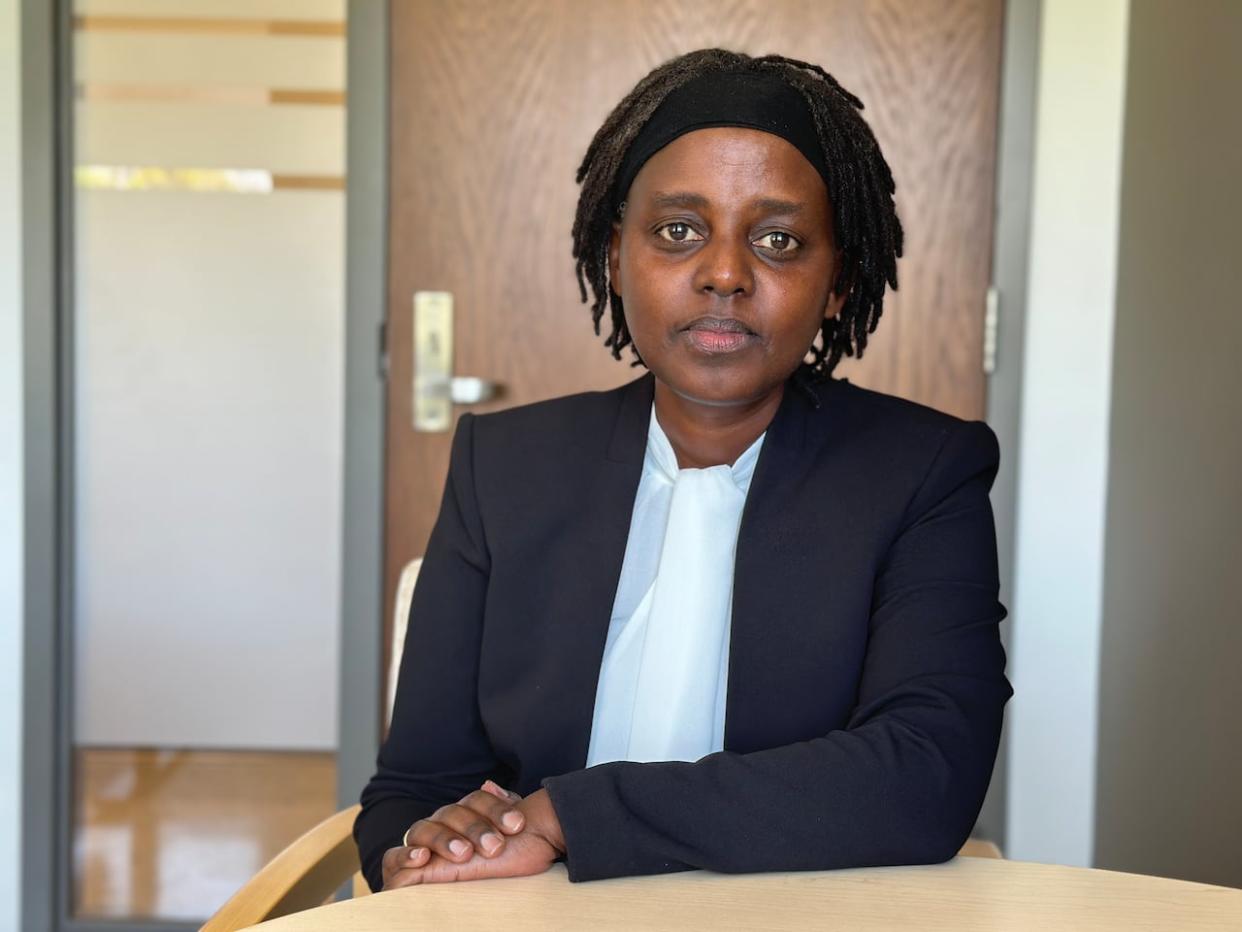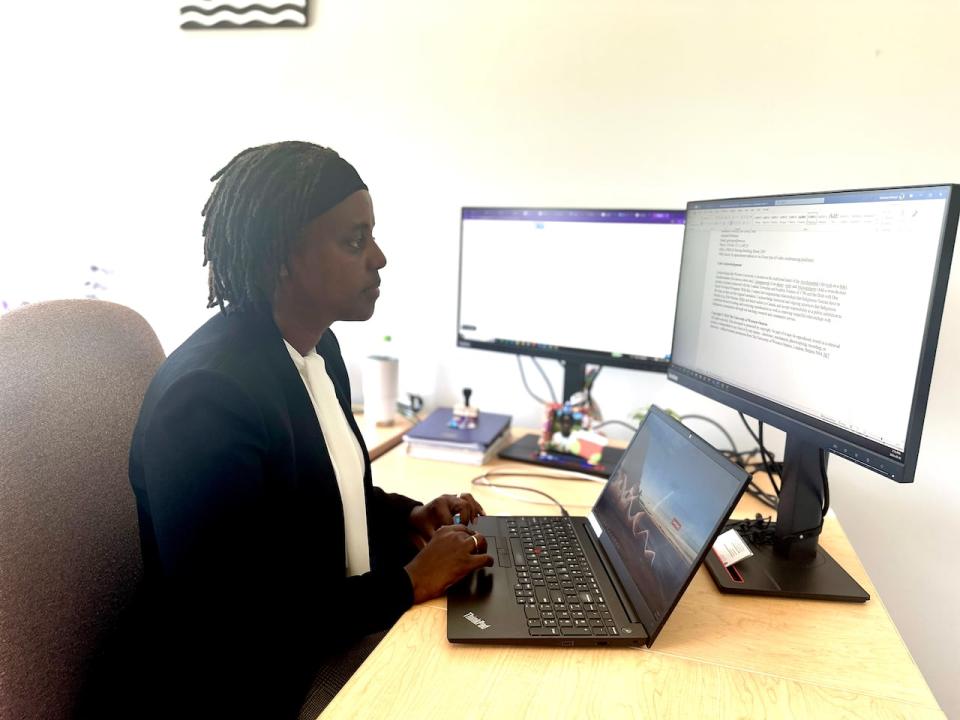She lived through the Tutsi genocide in Rwanda. Now she researches health of other survivors' kids

Warning: This story contains distressing details and discussions of sexual violence.
Glorieuse Uwizeye believes it was a miracle that she and her family survived the 100-day genocide in 1994 against the Tutsis, a minority group in Rwanda.
Thirty years later, Uwizeye is an associate professor in nursing at Western University in London, Ont., and studies the physical and mental health outcomes of survivors' children born during and shortly after the genocide.
"It makes me feel like I'm fulfilling my moral responsibility as a survivor and using my life to make a contribution," she told CBC News. "Surviving genocide, you feel like your life is very precious and you have those extra days for a purpose, and this research fulfils that purpose."
A study by Uwizeye and two American researchers was published in March 2023 in the American Journal of Biological Anthropology.
Her research focuses on three groups:
Children whose mothers were pregnant during the genocide, which lasted from April to July 1994.
Children conceived of rape during the genocide.
A control group of children born to Rwandan parents living outside the country during the genocide but who later returned there.
More than 800,000 Tutsi civilians were killed by the Rwandan military and Hutu militia during those months, and Uwizeye's research found its impacts still linger many years later.
"The effects of the genocide continue to be transmitted between generations, especially when you're exposed at a very young age when the body is being formed," she said.
"Rwandans whose mothers weren't living in the country while they were pregnant knew about the genocide, so of course they were also affected, but their exposure was different."
Uwizeye found children of parents who were pregnant in Rwanda during the genocide had poorer mental and physical health compared to those born outside Rwanda. Those health issues included post-traumatic stress disorder (PTSD), depression, anxiety, chronic pain, poor quality of sleep and problems with daily life functions.
However, children conceived of rape had even worse health outcomes compared to both groups because of societal factors that contributed to childhood adversities.
"Not only were these young people exposed to their mothers being raped and having to live with that, most of them don't know who their fathers or the other side of their family are," Uwizeye said. "Some of them didn't even know their birth origin until they were older."

Uwizeye's research found children conceived via genocidal rape had poor mental and physical health outcomes when compared to other groups. She says societal factors contribute to childhood adversities. (Isha Bhargava/CBC)
It's difficult to determine physical symptoms since many of Uwizeye's participants in Rwanda are fairly young, around 29 or 30 years old, she said.
To get a deeper look, Uwizeye has received a federal grant from the Social Sciences and Humanities Research Council (SSHRC) for longitudinal, community-based participatory research that will follow up with Rwandans, who were prenatally exposed to genocide, as they age and examine any potential impacts on their offspring. She also plans to share the findings with her participants.
Her [Uwizeye's] important knowledge mobilization work gives practitioners and policymakers the toolkit needed to inform better support services and policy responses - Sylvie Lamoureux, Social Sciences and Humanities Research Council
"When I was collecting data, I sensed a desire from these young people to understand the effect of their parents' experiences on their own health and the generations to come," Uwizeye said.
Sylvie Lamoureux, SSHRC's vice-president of research, said in an email that Uwizeye's research is "helping Canada and the global community respond more effectively to populations harmed by conflict to reduce negative impacts and support healing."
"Her important knowledge mobilization work gives practitioners and policymakers the toolkit needed to inform better support services and policy responses."
Journey from survival to nursing
Uwizeye knew from a young age that her life as a Tutsi wouldn't be easy. In elementary school, she and her peers carried identity cards stating if they were Tutsi, Hutu or Twa, and faced discrimination.
"I knew I could be killed any time, and sometimes I'd be graded unfairly just because of who I am. Your ethnic pool would determine if you could go to school, get a scholarship or even a job," she said.
When the genocide started, Uwizeye was a high school student studying nursing. It wasn't her first career choice, but it was one of the few professions Tutsis were allowed to pursue, she said. She got admission into a government high school that was affiliated with the Presbyterian church where her dad was a pastor.
Although there were some close calls, she and her family survived the ordeal by hiding inside their house for the entire 100 days.
After the genocide, Uwizeye finished her studies and got a high school diploma in mental health nursing, which became a major necessity in the country reeling from trauma, she said.
She started working with genocide survivors, documenting their experiences, and later did a presentation at an international symposium in Rwanda. Uwizeye completed a PhD in nursing at the University of Illinois in 2016 before settling in Canada in 2020.
Uwizeye integrates trauma- and violence-informed approaches to ensure her research doesn't cause more harm. She said her goal is to develop interventions to mitigate effects of genocide exposure to help other communities that have had similar experiences.
"I'm grateful for the years I get to live and do meaningful things, but the pain doesn't go away that people were killed for no reason but hatred. It makes me wonder what we're doing to prevent this from repeating around the world."
Help resources
For anyone who has been sexually assaulted, support is available through crisis lines and local support services via this government of Canada website or the Ending Violence Association of Canada database. If you're in immediate danger or fear for your safety or that of others around you, please call 911.


